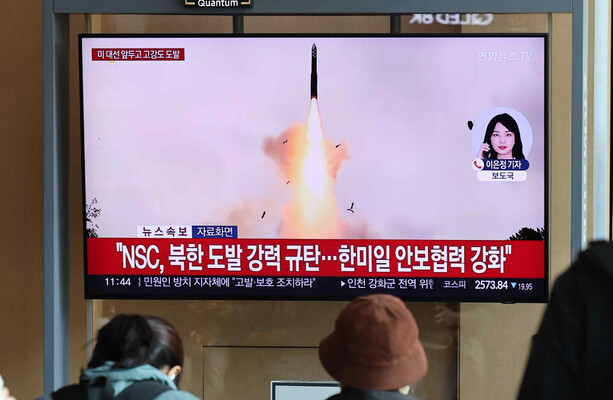Headline: Western Leaders Condemn North Korean ICBM Launch Amid Tensions
North Korea’s ICBM Test Sparks Global Outrage
In a provocative move that has escalated tensions on the Korean Peninsula, North Korea confirmed the successful test launch of an intercontinental ballistic missile (ICBM) just days before the upcoming U.S. elections. The action drew immediate condemnation from Western leaders, raising alarms about global security and stability. This test, which reportedly achieved record height and duration, comes amidst a backdrop of heightened military posturing by Pyongyang and serves to bolster its declared nuclear capabilities.
A New Era of Military Demonstration
On [insert date], North Korea conducted a significant missile test that has been characterized as one of its most ambitious displays of military capability to date. According to reports from various news outlets, including CNN and Sky News, the missile reached unprecedented altitudes and distances, showcasing advancements in North Korea’s long-range missile technology. Experts say the test is not merely a demonstration of power but also a strategic move by North Korea to assert its dominance in a precarious geopolitical landscape.
Kim Yo-jong, a senior official in North Korea and sister of leader Kim Jong-un, indicated that the nation is committed to "bolstering nuclear forces." This sentiment is echoed by military analysts who suggest that such tests are designed to send a clear message to adversaries, asserting North Korea’s readiness to engage if provoked.
Analysis of the Launch
Who is Involved?
The players in this high-stakes drama include North Korea, the United States, and South Korea, along with other key global actors such as Japan and nations part of NATO. Each of these stakeholders views North Korea’s actions through a unique lens shaped by historical relations and security interests.
What Happened?
The missile test involved what North Korea claims is a new ICBM, although detailed specifications remain classified. The test reportedly lasted several minutes, during which the missile reached a maximum altitude of 6,000 kilometers (approximately 3,728 miles) and was projected to have a range capable of reaching the continental U.S.
When Did This Occur?
The launch took place on [insert specific date], strategically timed just days prior to a pivotal election period in the United States, igniting speculation over how domestic politics may influence U.S. foreign policy toward North Korea.
Where Did the Test Occur?
The test was coordinated from North Korea’s eastern coast, a site known for previous launches targeting the Sea of Japan, raising immediate concerns for nearby nations regarding maritime security.
Why is This Important?
This missile launch underscores the fragility of peace in the region and challenges international diplomatic efforts aimed at denuclearization. Western leaders swiftly condemned the action, with U.S. Secretary of State Antony Blinken stating, "This reckless act endangers not only regional stability but poses a direct threat to global peace."
Implications for Global Security
As tensions escalate, the ramifications of North Korea’s missile test extend beyond immediate regional concerns. A heightened military posture could provoke greater defensive measures from neighboring countries, potentially leading to a renewed arms race in the region. Experts warn that this escalation could further complicate diplomatic engagements already strained by historical animosities.
Key Responses from Global Leaders
- Antony Blinken, U.S. Secretary of State: "North Korea must be held accountable for this provocative action."
- Fumio Kishida, Japanese Prime Minister: "Japan remains vigilant and prepared to counter any threats arising from North Korea."
- Yoon Suk-yeol, South Korean President: "We will bolster our defenses in response to North Korea’s increasing provocations."
Contextual Background
Historically, North Korea’s missile tests have been used to extract concessions from the international community, often resulting in sanctions or urgent diplomatic summits. The international community, particularly the U.S. and its allies, has long sought dismantling of North Korea’s nuclear capabilities through dialogue and economic pressure.
Related Articles:
Future Outlook
Looking ahead, the implications of this ICBM launch could lead to intensified military drills among U.S. and South Korean forces, increased sanctions from the United Nations, and potential disruptions in diplomatic negotiations. North Korea’s ongoing commitment to developing its missile technology suggests that further tests are likely.
While analysts are divided on the potential for future conflicts, many agree that sustained international pressure is essential to deter North Korea’s aggressive posturing. The situation remains fluid, and the global community watches closely to gauge the ramifications of this latest test.
The global dialogue surrounding North Korea’s actions is ongoing, and readers are encouraged to share their opinions or insights on this critical issue. As developments unfold, it becomes increasingly vital for nations to remain engaged, adaptable, and aware of the delicate balance of power in the region.
Join the discussion below. What do you think should be the international response to North Korea’s recent missile test?
For more updates on geopolitics and global security, visit our international affairs section for detailed analyses and expert opinions.
Image caption: A depiction of North Korea’s missile launch, showcasing the ongoing tensions in the region.
